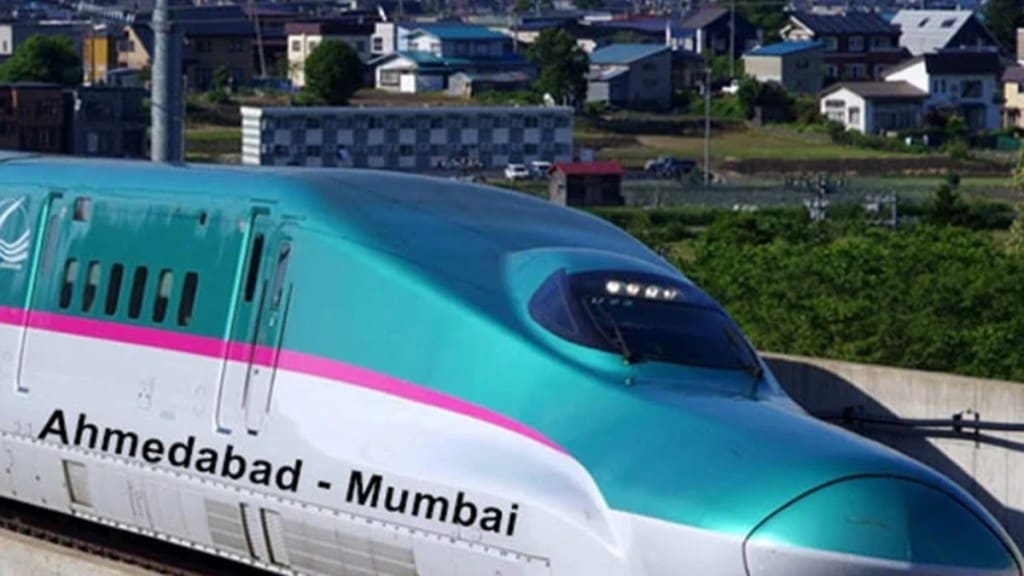The road leading to the construction site of the origin station of the 508-km long bullet train corridor wears a deserted look. The sight belies what’s happening within the fenced site, though.
Executives at the National High Speed Rail Corporation (NHSRCL), the company implementing the Rs 1.1-lakh-crore Mumbai-Ahmedabad bullet train project, say that work is on in full swing as the deadline for the 32-metre deep Bandra-Kurla Complex (BKC) station, the only underground station in the 12-station route, looms. Maharashtra chief minister Devendra Fadnavis has already said that the ambitious project, which runs through two states (Gujarat and Maharashtra) and a Union Territory (Dadra & Nagar Haveli), would be completed by 2028.
“The Gujarat leg of the bullet train has been progressing smoothly. We (Maharashtra) were lagging behind. We are making steady progress now. The project will be over by 2028,” Fadnavis said, providing an update on a project that is billed as being transformative for the Indian railway sector.
While the foundation stone of the high-profile project was laid in 2017, delays and hurdles in land acquisition, particularly in Maharashtra, had set the clock back for the rail line which is expected to cut travel time between Mumbai and Ahmedabad by more than half. Experts say that the rail corridor will unlock the business potential around its stations, which include Thane, Virar, Boisar, Vapi, Bilimora, Surat, Bharuch, Vadodara, Anand, Ahmedabad, and Sabarmati, besides Mumbai. The government plans to begin trial runs of the bullet train between Surat and Bilimora in Gujarat by 2026 as it sets sight on completing the rail project in the next three years.
Officials at NHSRCL told FE that approximately 76% of the excavation work for the underground station at BKC has been completed. About 1.42 million cubic metre has been excavated out of a total of 1.87 million cubic metre required to be excavated at the site. Work has also begun on the station wall and tunnel as the BKC station takes shape in the heart of the city.
“Work on the bullet train’s origin station at Mumbai’s BKC is progressing rapidly. Tunnel construction is moving swiftly. A multi-storey building will come up above the station, with three basement levels. B3 will be used for parking, B2 for operational work. While passengers will enter the station from B1 and the ground level,” an NHRCL spokesperson said.
The station will have six platforms, each approximately 415-m long (sufficient to accommodate a 16-coach bullet train). It will be connected to the metro and the road, NHSRCL said.
Two entry and exit points have been planned at the BKC station, one to facilitate access to the nearby metro station, and the other towards the MTNL building. The BKC station has been planned in a way that ample space is available for passenger movement and amenities at the concourse and platform levels, NHSRCL said, with a dedicated skylight to be provided for natural lighting.
Spanning across 508 km, the project will have a 21-km long tunnel, including India’s first 7-km long undersea tunnel under Thane Creek, and eight mountain tunnels, seven of which will be in the Palghar district of Maharashtra.
The total cost of the project is estimated at Rs 1.08 lakh crore. As per the shareholding arrangement, the central government will contribute Rs 10,000 crore, while the states of Gujarat and Maharashtra will each contribute Rs 5,000 crore. The remaining funding will be provided through a loan from Japan at 0.1% interest.
But while NHSRCL and the Maharashtra government commit themselves to completing the BKC and the Maharashtra leg of the much-anticipated project, voices have grown that it could result in a flight of business from the BKC district, a hub for financial services and diamond trading. In part, this has to do with high real estate prices in the city which has made it unviable for a number of small and medium enterprises to operate easily in the financial capital.
A recent Knight Frank report says that real estate prices have more than doubled in Mumbai compared to cities such as Delhi and Bengaluru in the last 10 years. And prices will continue to appreciate as infrastructure continues to develop in the megapolis. So, projects such as the bullet train may just provide small businesses the alternative to set up base elsewhere, real estate consultants said, as travel time reduces between key business centres such as Mumbai and Ahmedabad.
With a new diamond bourse set up in Surat recently, it will be interesting to see whether Mumbai remains an important destination for sectors such as gems and jewellery, once the bullet train gets going.
